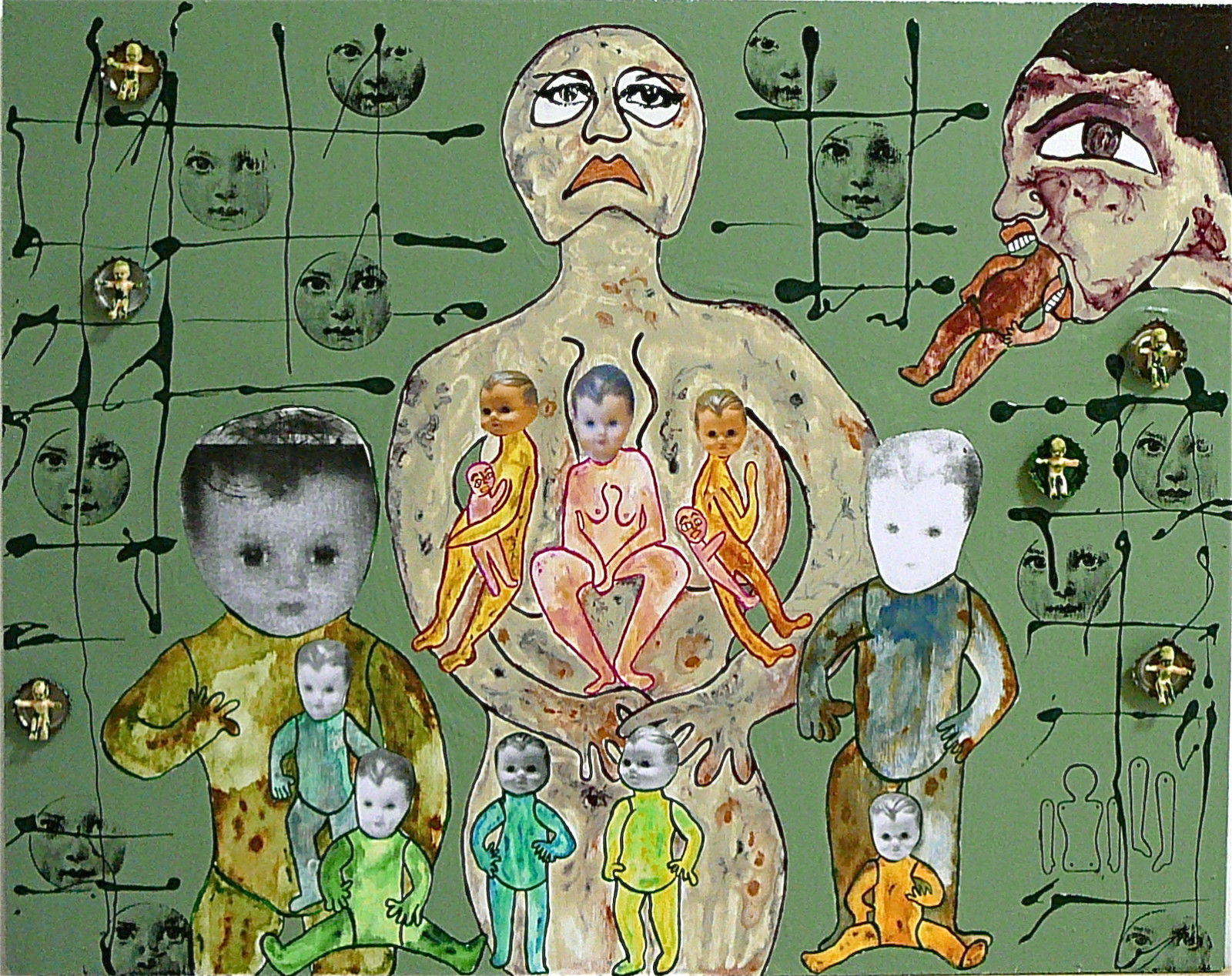In the literal realm, the description of the thing is the thing itself. It’s all the one thing, it’s all the one continuum – the continuum of logic, the continuum of thought. This has some very strange consequences with regard to what life is like when we are living in the literal (or concrete) realm.
For example, we can look at the equivalence between the description of happiness and the emotion or feeling itself. When things are the way I want them to be (i.e. when I have successfully obtained the situation that I desire for myself) then I take this as a literal confirmation (or affirmation) of the fact that I am happy.
The fact that everything is right, that everything is the way I want it to be, means that I must be happy. Therefore I am happy – how could I be otherwise? This desired state of affairs therefore becomes the literal descriptor of my happiness. Because in the literal realm the description of the thing equals the thing itself this necessarily means that these two things (my external situation and my state of perceived well-being) are actually one and the same. Success equals happiness, in other words.
And when things aren’t the way that I want them to be, when I am not in the desired situation, when things aren’t right, then by the same token I must be unhappy. The fact that things aren’t right, the fact that I haven’t got what I want to have, means that I am unhappy, and so this non-optimum state of affairs is itself the literal descriptor of my unhappiness. Thus, failure equals unhappiness. Both ‘success’ and ‘failure’ describe me therefore – more than describe me, they define me.
We could also say that when you say things to me that I want to hear, stuff that I like to hear, then this is the same as (is functionally equivalent to) ‘me being happy’. Just as a ‘good situation’ equals happiness, flattery (or ‘good news’) also equals happiness. Flattery (or ‘good news’) equals a good feeling because, in the literal realm, as we know, ‘the description is the thing’. Or as Eminem says, “I am whatever you say I am”.
The flip-side of this is of course that when you say things to me that I don’t like, stuff that I don’t want to hear, then this is functionally equivalent to ‘me not being happy’. Just as flattery equals pleasure, insults equal pain (or we could say, just as good news equals a ‘euphoric reaction’, bad news equals a ‘dysphoric reaction’). Its all either ‘agree’ or ‘disagree’. Because in the literal realm of psychological unconsciousness, the description equals the things (because I am whatever you say I am) your insults are synonymous with me feeling bad about myself. This is of course why insults tend to hurt our feelings!
From the point of view of the way I always see the world when I am in the state of psychological unconsciousness (which is the only way I can see the world) things and situations can only ever be one of two ways – they can either be the way I want them to be or the way I don’t want them to be.
Either my situation is to my advantage or it is to my disadvantage. Either the way things are is ‘good’ or it is ‘bad’. Either things are ‘right’ or they are ‘wrong’. Either I am winning or I am losing. This is of course because I am seeing everything from the point of view of the concrete self – the self that understands both itself and everything else literally! Seeing everything only from the point of view of the literal self is the same thing as being in the mode of psychological unconsciousness – these are two ways of saying the same thing. Unconsciousness is literalism – to be unconscious is to be literal-minded and to be literal-minded is to be unconscious.
We can see that the self must be literal in its nature since it is at all times governed by rules. Rules are quintessentially ‘literal’ – nothing is more literal than a rule. The self is basically a set of inbuilt biases, which then in life into a collection of ‘conditioned needs’. When the world conforms to my biases, agrees with them, matches them, and thus supports my needs, then I am happy. I feel pleasure, I feel satisfaction, I feel gratification. When there is a match between ‘what I want’ and ‘what I get’ then the set of rules which is the self is vindicated and I feel intense euphoria as a result. I am made up. I am over the moon. I am on top of the world.
It can be seen that when the self’s biases are matched (when there is an agreement between ‘what I want’ and ‘what I get’) then the aspects of my external situation which I am focusing on (i.e. the aspects which are important to me) are not different from the biases that lie behind my need to have them that way. In this case the external situation is a faithful reflection of the internal one – it is a reflection of it, a projection of it, a logical development of it, a linear extension of it. So the reason I feel euphoric when I have successfully controlled things so that there is an agreement or match between ‘the way they are’ and ‘the way I want them to be’ is because I have in this case successfully extended myself…
This is viral logic in a nutshell – the viral self wants only one thing and that is to impose its brand of order (which is the only brand it knows) upon the world, so that – in theory – the world will then become no more than a logical extension of itself. When I successfully extend myself then I feel ‘good’, and when I am thwarted in this all-important mission I feel ‘bad’, and this is all there is to know about the psychology of the viral or literal self. It doesn’t go any further than this…
I feel good, I am what I call ‘happy’, when I have got my own way, and ‘getting my own way’ comes down to eradicating anything that isn’t me, eradicating anything that doesn’t support me. When I feel good it is because I have successfully colonized the world around me. I feel good because have personalized the world, because I have made it me. The only way I – when I am identified with the viral or literal self – can get to feel good, feel satisfied, feel gratified, feel vindicated etc, is to do this; the only way I will be ‘happy’ is if I manage to successfully expand out into the world so that there is nothing in that world that is not me (or that does not agree with me). My victory (the victory of the viral or rule-based self) is thus to replace the world.
Curiously, the self also wins (in a sneaky or ‘not-so-obvious’ kind of a way) when the world doesn’t match its biases, when things aren’t the way it wants them to be, when it hasn’t managed to bring its own brand of order to the universe around it. The reason it is able to do this is because ‘disagreement’ is another form of agreement: if I have an expectation of the universe and the universe fails to deliver (as it often does) then this, for me, constitutes a form of agreement because I somehow imagine that it ought to deliver, that it is letting me down by not delivering, and so on. By projecting an expectation upon the universe in this way, therefore, I have sneakily fixed things so that it can’t help agreeing with me, even when it doesn’t…
Projecting expectations upon the universe is the same thing as asking closed questions of it. In this case – “Are you going to play ball with me or not?” or “Are you going to help me out here or not?” As soon as I ask the question I am imposing my own meaning on everything that happens next; I am imposing my own private meaning on all the possible things that might happen. So if what I want to happen actually does happen then the universe has agreed with me by it happening and I am delighted, I am over the moon; but if what I want to happen doesn’t happen then the universe has still agreed with me, it is still playing ball with me, and so my stance has been validated (my ‘question’ has been validated) every bit as much as if what I wanted to happen had happened…
The one possibility that I am completely oblivious to, completely impervious to, completely blind to, is that my expectations are totally unjustified, totally unwarranted, and therefore utterly and completely meaningless. This is the possibility that I am not prepared to see: I just want the universe to tick one of the above two boxes – either the ‘YES’ box or the ‘NO’ box. I just want the universe to play my meaningless game with me. I just want it to confirm my point of view. I just want it to confirm me.
YES and NO are always in perfect agreement with each other – they couldn’t agree more, in fact. If I say YES and you say NO (if I say DO and you say DON’T, if I say STOP and you say GO) then we are in perfect accord with each other because we are both in total agreement as to what the important issue is. As Alan Watts says, any two opposites are always secretly in cahoots with each other because neither can do without the other. After all, how can there be an UP without a DOWN, or an IN without an OUT? How can there be such a thing as a transaction in which there is ‘selling’ taking place but no ‘buying’?
Thus, when I wangle things so that the universe will either say YES or NO to me I am making sure that my standpoint is confirmed either way. If the universe plays ball that is great, and if it insults me by not playing ball then – although I will be in foul and rotten humour about it – on a deeper level (unbeknownst to myself) I am still gratified in an odd kind of a way because my position on things is still being validated as ‘a meaningful position to take’. The universe is still ticking my boxes. It’s still playing my game…
Failure therefore confirms my existence just as much a success does, even if it isn’t as pleasant, even if it doesn’t give that wonderful marvellous euphoric ‘hit’. Dysphoria is every bit as much a part of the life of the literal self as euphoria is – it is the drama that is made up by the two opposites of satisfaction and dissatisfaction, elation and despair, pleasure and pain, hope and fear which is the important thing, the constant oscillation between the two poles, the two ends of the spectrum. When we are caught up in this drama, this game, then pleasure and pain, elation and despair seem like very different things indeed. Good news and bad news, advantage and disadvantage, flattery and insults seem as if they are worlds apart, yet all of these opposites spell only the one thing and that one thing is the literally-understood self.
This is a very curious thing to understand since if the reality of this literally-understood self is confirmed or validated by its pain as much as by its pleasure, by its losing as much as by its winning, then this means that it literally is its pleasure and pain, its hope and its fear. As Krishnamurti says, I am my liking and my disliking, my elation and my despair, my hope and my fear. And if the literal self is both its pleasure and its pain, etc, then we can say that it is a two-sided entity, where the two sides at all times perfectly cancel each other out. It is a two-sided entity that at all times perfectly cancels itself out, but because when we are identified it (so that we think that this genuinely is who or what we are) we can’t see that this self-cancellation is going on. We can’t see it going on because we are flatly incapable of seeing that pleasure equals pain, hope equals fear, like equals dislike, elation equals despair…
The idea that pleasure and pain, despite being subjectively real facts to the concrete or literal self, are actually ‘compensatory’, is explained here by J.G. Bennett in this passage taken from The Dramatic Universe. (1970. P 188-9, 190-1) –
Isolated, the Reactional Self is a nullity. When it is in the state of delusion, it is unaware of its inability to perform any true act of will and, therefore, ‘believes’ in its own world. From this delusion it becomes subject to pleasure and pain as actual facts – being unable to see the compensation that reduces them to null-situations. The idea of nullity in polarity is illustrated in the electrical neutrality of large bodies; however intense may be the local electrostatic fields surrounding the atoms, there is a space-distributed compensation that makes the whole body almost perfectly neutral.
This two-sided or ‘dual’ self (which J.G. Bennett refers to as the Reactional Self, since it is always reacting to what is going on in either an affirming or a denying way) is constitutionally unable to have any awareness of the fact that there are these two sides to its nature. The dual self is only able to have awareness of one of these two sides at a time – it is only able to have awareness of the subjective fact that it is experiencing pleasure or pain, attraction or aversion, hope or fear, and so on.
Saying that the literally-understood self ‘can only experience one side of the story at a time’ is inherent in the very nature of literalism. Literalism is all about having ‘only the one meaning’ – it is like looking at the world down a long narrow tube which only shows us a very limited portion of what is out there, so that as a result of our limited view we see two different aspects or sides of the same thing as being different (or ‘independent’) things. So although the self has the two sides to it (and is constituted therefore equally out of pleasure and pain) it can only experience these opposites as being separated in time, i.e. it experiences happiness and unhappiness, optimism and pessimism, desire and fear alternatively. And not only does it experience them sequentially (or alternatively), it experiences them in such a way that the one always compensates for the other, leading to what J.G. Bennett calls ‘a null situation’.
When we say that the literal self alternatively experiences happiness and unhappiness this is however not to say that it alternatively experiences ‘joy’ and ‘sorrow’ because joy and sorrow are conscious emotions rather than unconscious ones. When this dual or literal self says that it is ‘happy’ it means that it is ‘happy for itself’, and when it says that it is unhappy it means – likewise – that its unhappiness is ‘all about itself’. So it is calling pleasure ‘happiness’ when really – as Krishnamurti points out – pleasure and happiness are two totally different things…
Pleasure is the confirmation or validation of the fixed and exclusive position that we have taken as being ‘right’, whilst pain – we might say – is the negative confirmation of that position as being ‘wrong’. Both ‘right’ and ‘wrong’ are equally confirming, and are in fact the very same thing, the very same message.
Happiness however is when we somehow get the freedom or the perspective to see that this position is not really the important thing at all, that it is not at all as central and all-important as we have always been given to understand that it was by the self-serving logic of the literal mind. In this view, therefore, happiness is freedom from the literally-understood self, freedom from the ‘self-orientated’ (or ‘literal’) way of seeing things. And just as happiness or joy is freeing, so too is sorrow because sorrow is also freedom from looking at the world from the point of view of the literal self.
The fact that the literal self is a dual or two-sided entity – where both sides are guaranteed no matter what happens to always cancel each other out – means of course that it doesn’t exist. Literalisms don’t exist – every single literal (or definite) statement that you might possibly think of it guaranteed always to be perfectly self-contradicting (or paradoxical) and when a statement is self-contradictory or paradoxical this is the statement’s way of telling you that it is perfectly meaningless.
The literal self itself however is constitutionally incapable of seeing that it doesn’t exist. The literal self is constitutionally incapable of seeing that it doesn’t exist because – as J.G. Bennett says – it can only ever be aware of one opposite at a time…
Image: wallpaperflare.com





